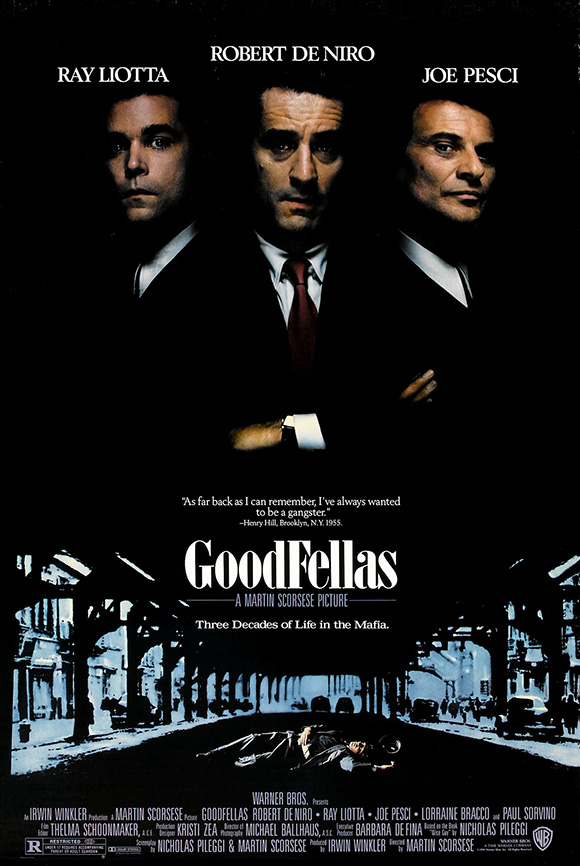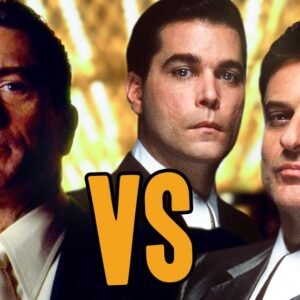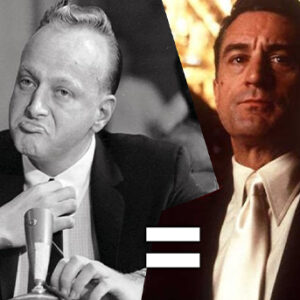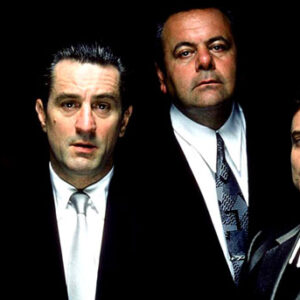Last Updated on October 12, 2021



Nice to see you again, fans of the cinema! This is the Face-Off, where two movies enter and both movies leave, but one leaves in a slightly better light. Yes, here we take two competitors and compare their key elements and see who comes out the champion. It's a fierce competition that results in blood, tears, and online arguments, but the more brutal the battle, the sweeter the victory.
After years and years of waiting, audiences finally get to see Martin Scorsese's long-gestating THE IRISHMAN on the screen. It may not be the big screen, and many people will only ever see it on Netflix, but it was worth it to get the movie made it all. Hailed as one of the director's best movies in years, it features stellar work from Al Pacino, Robert De Niro, and Joe Pesci. It's impossible for film fans to look at THE IRISHMAN and not think back to two of the filmmaker's earlier efforts in the same gangster genre — GOODFELLAS and CASINO — and that includes yours truly. So, with Scorsese's newest not available to all, I thought it would be great to take a look back at those two classic films from the icon.
Lists of the best gangster films would be incomplete without these two movies having prominent placement, and in the following segments we will break down why. Just as much as this an appreciation of both films, it's also a break down of which movie I think is better and in what ways. This is a tough one, but in the end, there can only be one capo of the two. So, put down the pasta forks, break out your bats, knives, guns and, in special cases, vices perfect for head squashing and let's get started.
Ray Liotta as Henry Hill
Robert De Niro as Jimmy Conway
Joe Pesci as Tommy DeVito
Lorraine Bracco as Karen Hill
Paul Sorvino as Paulie Cicero
Frank Sivero as Frankie Carbone
Frank Vincent as Billy Batts
Chuck Low as Morrie Kessler
Mike Starr as Frenchy
Samuel L. Jackson as Stacks
Robert DeNiro as Sam “Ace” Rothstein
Joe Pesci as Nicky Santoro
Sharon Stone as Ginger McKenna
Don Rickles as Billy Sherbert
Frank Vincent as Frankie Marino
James Woods as Lester Diamond
Kevin Pollack as Phillip Green
Alan King as Andy Stone
L.Q. Jones as Comminssioner Pat Webb
John Bloom a.k.a. Joe Bob Briggs as Don Ward
MEAN STREETS, TAXI DRIVER, RAGING BULL, LAST TEMPTATION OF CHRIST, THE DEPARTED — the list of classic films Martin Scorsese trails both before and after GOODFELLAS. Still, when I think of the quintessential Scorsese movie my brain instantly goes to his mafia epic. Not the intimate character study like some of his previous movies, he is still able to take a lead character and give him a full arc while shedding light on the greater mafia world with the kind of fascination and authenticity that makes for a compelling, entertaining journey. Everything that represents Scorsese doing his best work, like a focus on seriously flawed characters, the perfect integration of music, his iconic collaborations with regulars like De Niro, Pesci, and editor Thelma Schoonmaker and even his love of great food are all on full display. All of it comes together in this, his masterwork, giving this expansive, in-depth story kinetic pacing (Schoonmaker!) that hits hard and takes you through all the highs and lows of a life of crime, one that absorbs you into a world filled with gangsters as exposes an entirely secret culture. He makes us flies on the wall in a more gripping way then he does later in GOODFELLAS, with the highs being incredibly high (the walk through the Copa) and the lows making it feel like it's all about to crash and burn (Henry's drug-fueled paranoia). Scorsese's voice is stamped on every scene and demonstrates him at the height of his craft.
Getting back to proper gangster shit, CASINO represents Scorsese working at a similar form as GOODFELLAS, throwing us into a world of crime and excess that's both vicious and intoxicating to examine. Like before, the pacing is electric (Schoonmaker!!) and we go through an episodic expose of the crime-controlled areas of Vegas, all centered on some key figures who ran it all. His work here is so exemplrary of him at his most ambitious that in discussion of either it or GOODFELLAS you can't help but bring up the other. But as I will discuss in the “Script” section, his work on GOODFELLAS feels a bit more focused, and that's perhaps because the story itself is not as grand in scope. Not to say GOODFELLAS is not grand, per se, but CASINO finds Scorsese at a comparatively more expansive on a visual level, showcasing the sights and sounds of Vegas both in the shining city, the desolate desert and the characters standing in the center of both. This required him to balance a grand tapestry on a scale he didn't have to in GOODFELLAS, and while he did it expertly, he did have to go for it all right out of the gate and lean into the complexity of the Vegas system and all the character dynamics rather early on. There's something very operatic about it all, but there is a focus and more linear structure to GOODFELLAS that allowed Scorsese to tap into it with more personality, giving it a stronger voice that hits harder and faster and never lets up. The ambition behind CASINO is immense, and Scorsese executes it wonderfully, but again, with GOODFELLAS, I feel like there's more of Marty and all his hallmarks as a filmmaker stamped on the finished product that makes for a more absorbing movie, even if I do think here he gets into superior character work. Surely there's more to this discussion than I can fit on here, but in the end, GOODFELLAS is the man at his best, with this one not too far off.
“As far back as I can remember I always wanted to be a gangster.” The first real line of dialogue hits like a metal bat and kicks off this odyssey of crime in what is a masterful adaptation by Scorsese and Nicholas Pileggi (based on the latter's non-fiction book). At the start it doesn't take on a typical narrative structure, landing us in the middle of a body dump before launching back to teen Henry's initial fascination with the mob. While the script, from then on, does move forward in time as Henry continues his life of crime (with Henry narrating over), it moves episodically in a way that very few writers can make work, and as discussed above, Scorsese and Pileggi proved they're in that class. The epic tale of Hill can dig into his psyche — him taking pride in what he does — while covering the incredible scope of how this outfit of the mob functions, making for both a richly entertaining exploration of the man and his world. The script covers so much ground in a relatively short amount of time (145 minutes), introducing a colorful cast of characters, giving them crackling dialogue and coming to Hill's ultimate fall from mafia grace without an ounce of fat leftover. You can see traces of this kind of storytelling showing up in other dramatic epics, including Scorsese's future movies like CASINO, THE WOLF OF WALL STREET and THE IRISHMAN, and even later Paul Thomas Anderson embraced a similar structure for BOOGIE NIGHTS. A perfect blend of world-building and character development, we forget that Scorsese is just as talented behind the page as he is behind the camera, and the work he did with Pileggi should act as a constant reminder.
As said in the GOODFELLAS section, Pileggi and Scorsese took the same kind of episodic approach to the storytelling of CASINO (again, based on Pileggi's book), blowing it out to not only tell a tale set against the backdrop of organized crime but of the early days of Las Vegas. The story feels much grander in scale than GOODFELLAS, with the character dynamics being a bit more dramatic, even like a soap opera (a super violent one, at least). Laced within are the same themes of greed, ambition, and consequences, but hinged more on three central figures, as opposed to primarily Henry in GOODFELLAS. Because of this, I think CASINO has a harder time getting started than the former flick. Also taking place in the middle of a fascinating world of crime, filled with colorful characters, it covers a lot more and takes a bit more time to get everything set up, telling things from the perspectives of Ace and Nicky (via voiceovers). However, once things get going about an hour in, with everything and everyone set up, it hits just as hard as GOODFELLAS, painting a massive portrait of these flawed yet fascinating characters, all leading to their ultimate downfall via personal betrayals. The drama between the characters is gripping and provides a different kind of engagement to GOODFELLAS, with the tension between Ace, Nicky, and Ginger incredibly palpable, all three being fully fleshed out and engaging characters. But this is all once it kicks off the training wheels and gets going. As much as I love this movie I am always reminded how much scope it takes on and has to establish at the start, making not as instantly absorbing and focused as Scorsese's earlier gangster epic.
Bits:
Issue in the Trunk
Parking Cars
Mailman in the Oven
Meet Jimmy
Meet a Bunch of Wise Guys
Funny Guy
Lorraine Braccoo Goes Off
Traveling through the Copa
Neighbor Beatdown
Get Your Fuckin’ Shinebox
Dinner Before the Dump
Tommy Shoots Spider
Wake Up to a Gun
Prison
Don’t Buy Anything!
Tommy Gets Whacked
Paranoid Pursuit
Down the Drain!
Ratting
Witness Protection
Lines:
Tommy: “You mean, let me understand this cause, ya know maybe it's me, I'm a little fucked up maybe, but I'm funny how, I mean funny like I'm a clown, I amuse you? I make you laugh, I'm here to fuckin' amuse you? What do you mean funny, funny how? How am I funny?”
—–
Henry: “As far back as I can remember I always wanted to be a gangster.”
—–
Billy: “Now go home and get your fuckin' shinebox.”
—–
Henry: “Paulie may have moved slow, but it was only because Paulie didn't have to move for anybody.”
—–
Henry: “But now the guy's gotta come up with Paulie's money every week, no matter what. Business bad? Fuck you, pay me. Oh, you had a fire? Fuck you, pay me. Place got hit by lightning, huh? Fuck you, pay me.”
—–
Jimmy: “I'm not mad, I'm proud of you. You took your first pinch like a man and you learn two great things in your life. Look at me, never rat on your friends and always keep your mouth shut.”
—–
Henry: “One day some of the kids from the neighborhood carried my mother's groceries all the way home. You know why? It was outta respect.”
—–
Henry: “You know, we always called each other good fellas. Like you said to, uh, somebody, “You're gonna like this guy. He's all right. He's a good fella. He's one of us.” You understand? We were good fellas. Wiseguys.”
—–
Henry: “Only cops talk that way. If they'd been wiseguys, I wouldn't have heard a thing. I would've been dead.”
—–
Henry: “Jimmy was the kind of guy that rooted for bad guys in the movies.”
—–
Karen: “I know there are women, like my best friends, who would have gotten out of there the minute their boyfriend gave them a gun to hide. But I didn't. I got to admit the truth. It turned me on.”
—–
Henry: “And then there was Jimmy Two Times, who got that nickname because he said everything twice, like:”
Jimmy Two Times: “I'm gonna go get the papers, get the papers.”
—–
Henry: “For us to live any other way was nuts. Uh, to us, those goody-good people who worked shitty jobs for bum paychecks and took the subway to work every day, and worried about their bills, were dead. I mean, they were suckers. They had no balls. If we wanted something, we just took it. If anyone complained twice they got hit so bad, believe me, they never complained again.”
—–
Tommy: “Oklahoma Kid. That's me. I'm the Oklahoma Kid. You fuckin' varmint! Dance. Dance. YAHOO, YA MOTHERFUCKER!”
—–
Bits:
Car Explosion
Meet Ace
How Vegas is Run
Meet Nicky
The Gorgeous Ginger
Hand Bash
Use His Head to Open the Door
Nicky Starts His Own Racket
Head in a Vice
Blueberries
Lester Diamond Beatdown
Ginger and Nicky
No-Pants Ace
Plane on the Golf Course
Late Night With Ace
Meeting in the Desert
Nicky Gambles
Frank Vincent Gets His Own Narration
Ginger Goes OFF
Consequences: Nicky Killed/Ginger ODs/Ace Survives
New Vegas
Lines:
Ace: “In Vegas, everybody's gotta watch everybody else. Since the players are looking to beat the casino, the dealers are watching the players. The box men are watching the dealers. The floor men are watching the box men. The pit bosses are watching the floor men. The shift bosses are watching the pit bosses. The casino manager is watching the shift bosses. I'm watching the casino manager. And the eye-in-the-sky is watching us all.”
—–
Ace: “No matter how big a guy might be, Nicky would take him on. You beat Nicky with fists, he comes back with a bat. You beat him with a knife, he comes back with a gun. And if you beat him with a gun, you better kill him, because he'll keep comin' back and back until one of you is dead.”
—–
Ace: “The town will never be the same. After the Tangiers, the big corporations took it all over. Today it looks like Disneyland. And while the kids play cardboard pirates, Mommy and Daddy drop the house payments and Junior's college money on the poker slots.”
—–
Nicky: “I'll get up nice and early, take a walk down over to the bank and… walk in and see and, uh… if you don't have my money for me, I'll… crack your fuckin' head wide-open in front of everybody in the bank. And just about the time that I'm comin' out of jail, hopefully, you'll be coming out of your coma. And guess what? I'll split your fuckin' head open again. 'Cause I'm fuckin' stupid. I don't give a fuck about jail. That's my business. That's what I do.”
—–
Nicky: “A lot of holes in the desert, and a lot of problems are buried in those holes. But you gotta do it right. I mean, you gotta have the hole already dug before you show up with a package in the trunk. Otherwise, you're talking about a half-hour to forty-five minutes worth of digging.”
—–
Ace: “In the casino, the cardinal rule is to keep them playing and to keep them coming back. The longer they play, the more they lose, and in the end, we get it all.”
—–
Nicky: ” lost control? Look at you, you're fucking walking around like John Barrymore! A fucking pink robe and a fucking cigarette holder? I lost control?”
—–
Ace: “Once a fuckin' hooker, always a hooker.”
Ginger: “Oh, fuck you! Fuck you, Sam Rothstein! FUCK YOU!”
—–
Ace: Can you do it with your left hand?
Signaller: Well, I… I never tried.
Ace: So you're a righty?
Signaller: Yeah.
[Guard bashes his hand]
Ace: Now you're gonna have to learn with your left hand.
—–
Nicky: “Get this through your head you Jew motherfucker, you. You only exist out here because of me. That's the only reason. Without me, you, personally, every fuckin' wise guy skell around'll take a piece of your fuckin' Jew ass. Then where you gonna go? You're fuckin' warned. Don't ever go over my fuckin' head again. You motherfucker, you.”
—–
As it seems to be the case with other movies I've been covering as of late in this column, Scorsese went without a typical score in favor of a soundtrack that favored music of the era GOODFELLAS took place in. By using only music that would be heard by the characters whatever year the scene takes place in, we go through the years of music as the characters do, giving the atmosphere an air of authenticity and specific scenes greater depth. In Henry's teen years, as he's a young crook in the making, we get the music of Tony Bennett and the Cleftones, the kind of big-band music you'd hear in night clubs with men in fine suits and women in expensive dresses in the crowd. Going forward, more modern rock n' roll and folk music shows the sign of a changing time, Scorsese including tracks from Cream, The Rolling Stones, George Harrison and ending it all with Sid Vicious' take on “My Way”. As bodies stack up and Henry grows increasingly paranoid this music has a level of stark reality and hard-hitting power to up the stakes and level of danger. Scorsese is a man who knows his music, so of course, he offers up a perfect soundtrack to go with GOODFELLAS, even if I do think the choices play a bit better in the next movie.
Again, Scorsese knows his music, and given that CASINO feels more operatic in scale, it's appropriate he (working with music assembler, Robbie Robertson) kicks things off with a piece of music like Johann Sebastian Bach's “St. Matthew Passion”. Sweeping, tragic, fit to go along with an image of Ace floating through fire. But getting into the entire scope of the movie, the selected tracks add an extra layer of style and energy, moving between rock and soul tracks of the 70s, some of the aforementioned instrumentals (including “Contempt – Theme De Camille” by George Delerus). Some stand out inclusions are “I Aint Superstitious” by Jeff Beck, used when Ace is eyeballing the grifters in the first act (leading to some mafia justice); The funk of “I'll Take You There” from The Staple Singers during the honeymoon phase of Ace and Ginger's marriage; The Animals' “The House of the Rising Sun” when all the old mobsters are getting their comeuppance in the end, and so much more. In the end, any great Scorsese movie comes with a great score or soundtrack, and when comparing these two titles you get the best sense of what kind of music has taken the deepest roots in him. While I do think GOODFELLAS' music is used more effectively in a narrative sense, the soundtrack for CASINO has a more visceral effect, with a more varied collection of tracks creating a real kaleidoscope of sounds and sensations. I mean, any movie that uses “Go Your Own Way” by Fleetwood Mac while Pesci and De Niro discuss the latter's marriage troubles should get the win in this section, no?
Cadillacs, big suits, swank night clubs — Scorsese recreates the 50s, 60s and eventually 70s era of the East Coast mob with style…at least as far as that goes for gangsters. Costume designer Richard Bruno, production designer Kristi Zea and the whole team who brought this world of gangsters to life get serious props for establishing the look and feel of the era. It's sort of hard not to feel immersed on the lives of all the shady goings-on when Scorsese plunges up deep into their hangouts, like the Copacabana sequence as Liotta and Bracco, all dressed to the nines, make their way through the kitchens and backways and into the showroom, dimly-lit by the candles on the tables and the spotlight shining on Henny Youngman. People of this stature need cars to fit their personas, and GOODFELLAS is a reminder there's nothing like seeing big Cadillacs cruising down the street like big boats out of water. Growing up with this movie I've also grown more fond of how Scorsese and the costume and makeup team age the characters through the years, peppering De Niro's hair to make him look older before he was de-aged drastically almost 30 years later for IRISHMAN. For Henry, his hair grows bushier and his clothes get looser as he moves into the 70s and the drug trade — it's a great way to show his character's evolution in understated ways. If THE GODFATHER brought its gangster figures to life with big cars, big suits, and bigger hats, GOODFELLAS showed off more of the dazzle of the characters, to the point where you can almost smell the hair gel.
If GOODFELLAS had a bit of flash, CASINO blows out the doors and brings Vegas to life in all its glory. Bright lights dominate the room, and De Niro dominates the frame with his ever-changing series of colorful suits. De Niro has never had a better wardrobe than he has in CASINO, rocking everything from a baby blue suit to a pink bathrobe. Throw in Sharon Stone rocking all sorts of elegant wear and some big-ass fur coats, and you got some masterful costume design (John Dunn and Rita Ryack) between the two of them alone. But Vegas is made such a big star thanks to the production design department (led by Dante Ferretti), and cinematographer Robert Richardson giving the vast desert and casino floors their proper showcase. CASINO is drama and decadence and the look of it all is pure extravagance, showing a high point of the city before it all came crashing down into an era of consumerism that De Niro's Ace later laments. No, it doesn't have the same gritty look to it that Scorsese's other crime epic does, but this is also not the same kind of movie, and even with all the gangsters it emphasizes a whole new kind of world. It's world of no-holds-barred style that Scorsese and the crew pull out all the stops for, making it the kind of place you wanna live in, warts and all.
Awards
Oscars:
- Won – Best Supporting Actor – Joe Pesci
- Nominated – Best Supporting Actress – Lorraine Bracco
- Nominated – Best Picture
- Nominated – Best Direction – Martin Scorsese
- Nominated – Best Editing
- Nominated – Best Adapted Screenplay
Golden Globes:
- Nominated – Best Picture – Drama
- Nominated – Best Director – Martin Scorsese
- Nominated – Best Adapted Screenplay – Martin Scorsese, Nicholas Pileggi
- Nominated – Best Supporting Actress – Lorraine Bracco
- Nominated – Best Supporting Actor – Joe Pesci
**Another 43 Wins and 28 Nominations**
Praise
- Rotten Tomatoes: 96% (97% Audience)
- IMDb: 8.7 (Top Rated Movie #18)
- Metacritic: 90 (8.9 Audience)
- $46 million ($46 million globally)
Awards
Oscars:
- Nominated – Best Actress – Sharon Stone
Golden Globes:
- Nominated – Best Director – Martin Scorsese
- Won – Best Actress – Sharon Stone
**Another 3 Wins and 9 Nominations**
Praise
- Rotten Tomatoes: 80% (93% Audience)
- IMDb: 8.2 (Top Rated Movie #140)
- Metacritic: 73 (8.8 Audience)
- $42 million ($116 million globally)
Since the early days of movies, gangsters and thugs have had a role to play in them, with figures like Bonnie and Clyde, Al Capone and John Dillenger turning crime into a celebrity maker in pop culture. THE GODFATHER would revolutionize the genre decades later with a more authentic, dramatic approach to gangsters and the mob unseen by the public before. Through the genres many entries and evolutions, it's clear audiences will always be fascinated with the world of gangsters and the mob, and Scorsese has dipped his toes into the genre several times across his career to immense success. With GOODFELLAS, he brought audiences into the mafia world in a way even GODFATHER didn't, bringing to the screen real-life figures with an in-depth examination, energy, and often profound violence that drives home just how cold and soulless these men were. The violence in this movie may seem tame compared to modern movies, and even CASINO for that matter, but in showcasing just how vicious their gangster business got Scorsese pulled no punches. The killing of Billy Batts, from barroom to trunk is grim and bloody, made only more cold when they stop off for dinner at Tommy's mom's house — a nigh-alive Batts in the trunk. All the killings are brutal and lacking any remorse (maybe a bit of black comedy), whether it be Tommy blasting away Spider after he told him to “F**k himself,” or the crew whacking Tommy after making him think he was about to become a made man. As much as the movie shows a lighter side to their lives, Scorsese knows to show just how brutal these men were. But to reiterate, what makes his work on the movie so timeless is how he brings to life the entire gangster world, detailed by Henry's voiceovers. “If we wanted something we just took it,” as he says. among other fine reflections on his years of crime. This also includes detailing a whole culture of food and family. The Italian dishes, even the ones made in prison, make the mouth water and prove Scorsese's passion for good food. As for the familial aspects, Karen's voiceovers give great insight, like, “whatever we did we did it together,” when talking about how close-knit the community was. As far as gangster business goes, GOODFELLAS showcases so much to be fascinated and shocked by, painting a full portrait of the gangster lifestyle, up to the very end.
CASINO takes a different approach to the life of gangsters than GOODFELLAS, focusing on a specific period and setting with Vegas in the 70s, with Pileggi and Scorsese's script exploring how the mob-controlled various parts of the Sin City. While there's more focus on character drama and their actions with and against each other, there is still very much a crafted world of gangster shit going on. From the earliest moments we get a big car bomb for Ace, then going back and into the casino world as voiceovers detail all the shadiness and scamming goes on behind closed doors. In doing this we even get some proper gangsters eating proper gangster food, with big dishes being cooked as we learn a small room full of aging mafiosos are the ones secretly running Vegas (Pawn Stars only control about 15 percent). Across three hours we get to see gangster business in an actual business sense as they run Vegas, which that in of itself makes CASINO stand apart from GOODFELLAS even though they're so similar in structure. There's also plenty, PLENTY of mob violence, like Ace and his guys bashing in one scammer's hand, Nicky putting a guy's head in a vice and your various shootings and stabbings. The violence is way more in your face this time around, and the final killing of Nicky, in particular, hitting with a special brand of brutality. And if we're talking mob wives, Sharon Stone takes the cake over all others as Ginger, who gets to show off crazy ranges of emotion and look fabulous doing it. I love me some Lorraine Bracco, but Stone is in a class all her own here and is the supreme at which crime wives must live up to. Scorsese gives life to these kinds of worlds and figures like no one else, and CASINO is him doing his gangster shit at some tremendous levels. And yet, GOODFELLAS is, as far as gangster movies and gangster business go, the cream of the crop of the genre.
When it first came out critics admired CASINO, and it did get some awards attention befitting a Scorsese movie, but it wasn't acknowledged as one of his best. Not the kind of critical reprisal given to say, THE SHINING, but still, the movie has been looked upon more favorably in recent years, often being hailed as one of the director's very best. To some, it's even better than GOODFELLAS, which was much more favorably seen when it came out. Perhaps it was because of GOODFELLAS that CASINO was put on such a high pedestal. With my recent rewatch, there are indeed elements that work better for CASINO, like the music, the visual scope and even the cast of actors, with Pesci and De Niro doing better work here than in FELLAS, and Sharon Stone taking things to the next level while decked in jewels and furs. And yet, on a storytelling and execution front — taking into account scripting, editing, and the sheer attention to detail that brings it all to electrifying life — GOODFELLAS is the mob movie to rule them all. It's fast-paced, violent, funny, brilliantly acted, perfectly edited and eternally absorbing in its depiction of the mob and one man's rise and fall in it. It's a timeless odyssey through crime (and one that doesn't push three hours, either), that finds Scorsese — the master — and his very best, with every facet executed perfectly. Even with CASINO, THE WOLF WALL STREET, THE DEPARTED and THE IRISHMAN coming after — all centering on crime in epic ways — none of them move, sound or entertain in the same ways as GOODFELLAS (though each shine in their individual ways). To put the final stamp on it, GOODFELLAS is a perfect movie, made all the better for selling the case that pasta and wine should be the cornerstone of any diet.
Appreciate GOODFELLAS even more with this tribute JoBlo slapped together in 2015 to mark the movie's 25th anniversary!




















Follow the JOBLO MOVIE NETWORK
Follow us on YOUTUBE
Follow ARROW IN THE HEAD
Follow AITH on YOUTUBE